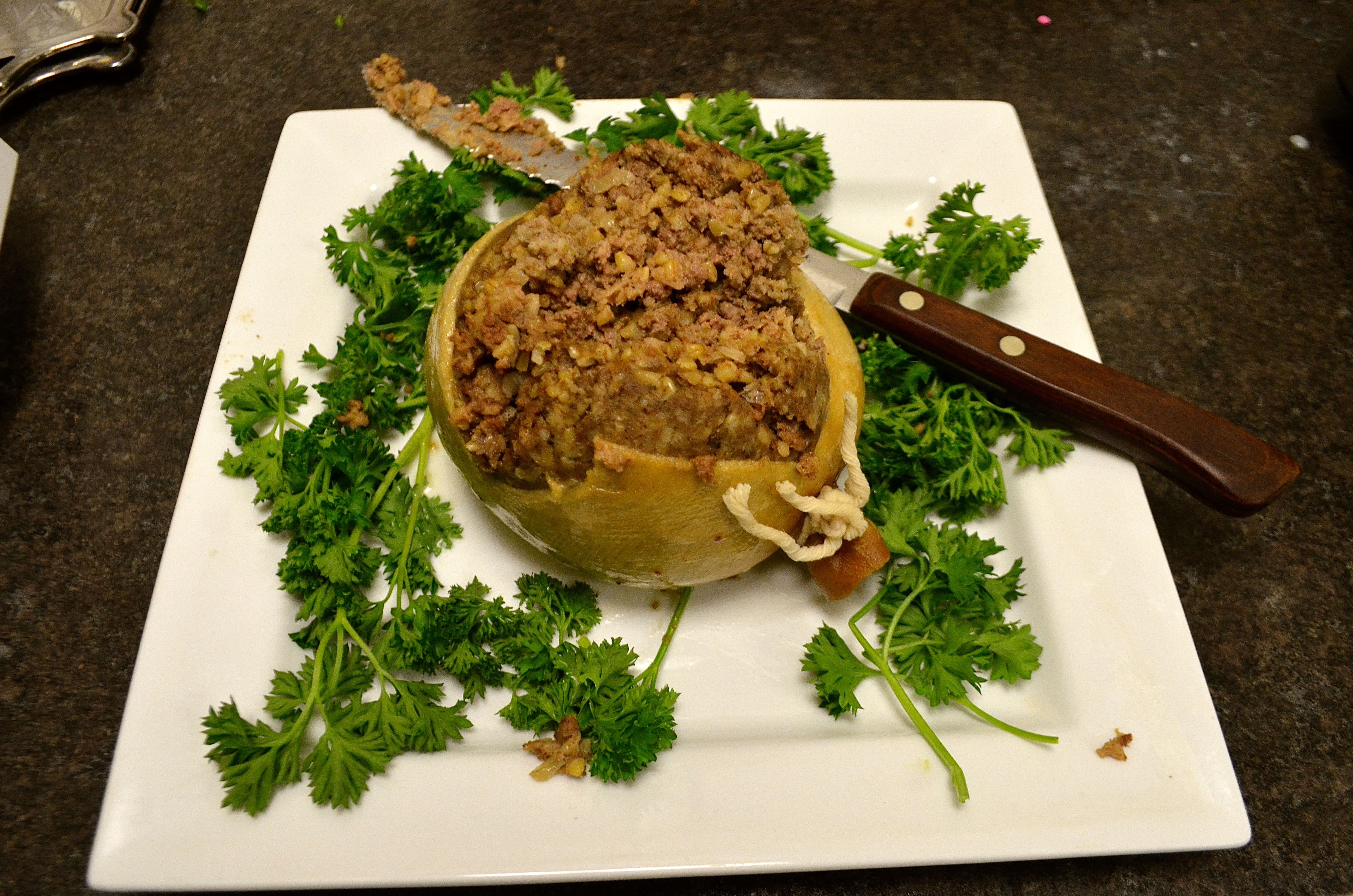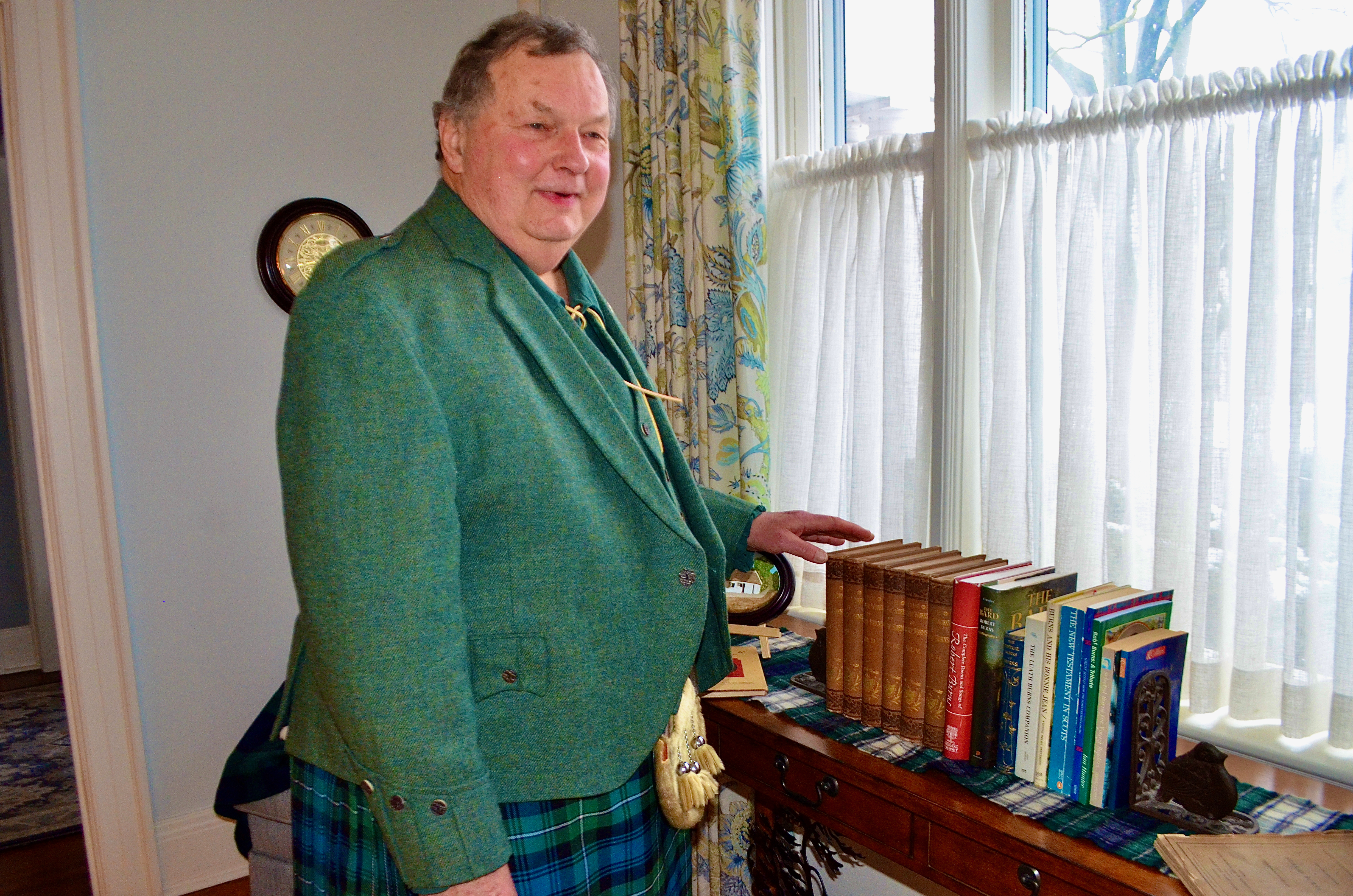Few would describe haggis as a culinary delicacy, but it is an essential ingredient for any Robbie Burns Day celebration and is always the main dish during Cambridge doctor, Jay Baker’s, annual Burns Suppers.
“I really like haggis,” said Baker. “Not everybody does, but the people that come to my two Burns dinners have always seemed to like the haggis.”
It has been said that those who love sausage should avoid seeing how it’s made and the same rings true of haggis, especially the way it was made in the 1700s when Robbie Burns was alive.
“I would have a hard time eating haggis the way it was originally made, but we are talking about a time when most people didn’t have a lot to eat,” Baker said. “They were using the leftovers from other meals, as well as intestines, lungs, hearts, and livers. You grind it up and mix it with oatmeal and a lot of spices then it is cooked inside a sheep’s stomach.”

In his famous poem, Address to a Haggis, Burns compares haggis to the finest French cuisine and describes it as the “Great chieftain o the puddin’ race. Aboon them a’ ye tak your place.”
Burns’ tongue-in-cheek review elevates and dignifies this humble staple of the poor and pokes fun at the elite of 18th Century Europe who, “Looks down wi sneering, scornful view on sic a dinner.”
Echoes of that scornful view still resonate today, but Baker contends that the modern version of the offal sausage isn’t really all that awful after all.
“Haggis doesn’t get a fair shake around this time of year because it will get talked about in the media,” said Baker. “They will describe the original haggis so, someone who hasn’t tasted it before will not be willing to taste it.”
Nevertheless, demand for haggis is growing especially during the weeks on either side of Jan 25, Robbie Burns Day.

“If you’ve had haggis in Southern Ontario, it likely came from the same place, a butcher in Dundas,” Baker said. “They don’t put all the lungs and intestines in it anymore. Basically, it is liver, heart, and kidney. It always tastes pretty much the same unless somebody makes it themselves.”
Baker’s acquired taste for haggis, Robbie Burns, Scotch whiskey and all things Scottish, can be attributed, in large part, to the influence of his Scottish grandparents, who shared a home with him and his mother in Brantford when he was young.
Despite being born in Ontario, he inherited a Scottish brogue that he can summon effortlessly and sometimes involuntarily.
“In fact, the first time I went to Scotland, 15 years ago, I got accused of making fun of the accent,” he said. “Because of being raised by my grandparents, the sound of the Scottish dialect is in me, and I started to speak with the accent.”
Baker describes his first trip to Scotland as a pilgrimage to Burns territory and it included a visit to the Globe Tavern in Dumfries where the creator of more than 300 timeless poems such as Auld Lang Sine, Tam o’ Shanter and Comin’ Thro the Rye, was a frequent patron up until his death from rheumatic fever in 1796 at the age of 37.

The chair Burns used during his frequent tavern visits is reserved for those who can accurately recite the works of the Ploughman Poet. Baker has many of the poems memorized and he convinced a tavern barmaid to escort him to the chair and listen.
“I sat in the chair and recited some Burns,” he said. “Then I asked her, ‘How did I do?’
She said, ‘I think you did very well, but I didn’t understand a word of it.’
It suddenly dawned on me that the dialect in his poetry is Old Scots so, people today in Scotland would not understand the words any more than you or I.”
Baker’s command of the Old Scots dialect has made him a popular voice at local Burns Day celebrations for more than 20 years. Before the pandemic he was getting as many as four requests a week to recite the Address to a Haggis and/or the Selkirk Grace.
“This year I was invited to one this Saturday at Wesley United Church and we have Burns’ Supper here the next Saturday,” he said. “We used to do two, because there were so many people that wanted to come.”
The decoration, preparation and congregation for a symbolic, communal meal resembles in many ways, the rituals of a religious service.
“The Burns Supper is quite a formalized event,” said Baker. “It is almost religious in a way. We have a piper who comes, and he entertains for a while. The haggis is cooked, and we walk around the house three times just to get the sense of having a procession with the haggis. I do the Address to the Haggis and then we eat.”
To celebrate the true spirit of Robbie Burns it is traditional to raise a glass of Scotch.
“There is always a toast to the lassies and a response from somebody else,” Baker said. “Then there is the Immortal Memory, which is sort of an educational 20 minutes or so, which I always do. So, you research his life or some aspect of his life.”
Baker’s research has revealed that there are more than 600,000 Robbie Burns Day Suppers held around the world every year including places such as Moscow, Russia and Beijing, China. Burns is also among the top three, non-religious, historical figures to have statues erected in their honour.
“The only two people who have more are George Washington and Queen Victoria and they have been pulling down their statues lately so, it may well be that Burns ends up having more statues than anybody,” he said.
Though the Old Scots dialect might be difficult to translate, even for modern Scottish citizens, Burns’ poetry continues to resonate, entertain, and inspire and Baker thinks he knows why.
“I think he appeals to the common person,” he said. “I think his poetry is not hoity toity. It is down to earth. It talks about nature. It talks about women. It talks about friendship and loyalty. A lot of the things are so common.”



